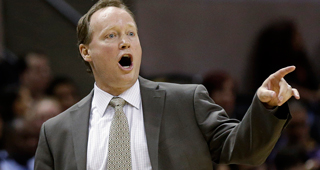The Atlanta Hawks were the surprise of the NBA during the 14-15 season. They raced out to one of the league’s best records and finished atop the Eastern Conference in the regular season. A successful season was ended by a combination of untimely injuries and a very good Cleveland Cavaliers’ squad in the Eastern Conference Finals.
The Hawks entered the offseason with a good amount of cap space and some key free agents. Unfortunately for Atlanta, because DeMarre Carroll and Paul Millsap were Early Bird Free Agents, they couldn’t exceed the cap to re-sign them. This left the Hawks in a position where they likely had to choose one over the other. The Hawks chose to re-sign Paul Millsap. Millsap has a longer track record of success and has proven to be a perfect fit for the systems Atlanta runs offensively and defensive. With the departure of Carroll, Millsap is likely going to be asked to play more small forward this year than he has in the past couple of seasons. His transition to this position is going to be the key for the Hawks continuing as a contender versus falling back to the middle of the pack in the Eastern Conference.
The reason Millsap may be playing some SF is because the Hawks acquired Tiago Splitter in trade with the Spurs. Mike Budenholzer is familiar with Splitter from his time as an assistant coach with San Antonio. Splitter gives Atlanta a legit post presence at the center positon. It also allows Al Horford to move over to PF, where many think he may be a nightmare for opposing defenses. Splitter also gives the Hawks a rim protector who isn’t afraid to the do the dirty work on both ends.
At the Draft, the Hawks made one of the more surprising moves of the offseason. Following the Joe Johnson trade of a few seasons back, the Hawks swapped the 29th pick for the 15th pick with the Nets. This put the Hawks in position to potentially land an impact player. Instead, they traded the pick in a three-team deal with New York and Washington. The Hawks ended up with Tim Hardaway Jr. and two future second round picks. How Hardaway Jr. fits the Atlanta system is a major question mark. He doesn’t offer the defense that Carroll did, and his offense hasn’t been great in either of his two NBA seasons. Perhaps in the Hawks’ offensive system, with better players around him, Hardaway will flourish off open looks but this was a surprising move.
The other addition, Justin Holiday, looks like an end of the bench guy coming from a successful program in the Golden State Warriors. Sounds an awful lot like Kent Bazemore, right? Bazemore went on to have a nice season for Atlanta and was even more successful in the playoffs after injuries decimated the roster. The Hawks would love to get a similar return from Holiday this year, but will be happy to have a productive player at the end of their bench.
The players moving on won’t really be missed, minus Carroll. While Pero Antic offered the ability to stretch the floor from the center position, his second season was worse than his rookie year. And he didn’t offer much as a defender or rebounder. John Jenkins never lived up to his billing as a shooter and was unable to crack the rotation. Elton Brand will be missed as a locker room presence more than anything, because his impact on the court was limited last season.
DeMarre Carroll will obviously be missed. He was a lightly regarded free agent signing by Atlanta two years ago. It was thought he would be a defense and energy guy off the Atlanta bench. He immediately became a starter and offered the aforementioned defense and energy, but the real surprise was his offensive output. Carroll came to Atlanta having made a total of 27 three pointers in his previous 4 seasons. In two years with the Hawks he made 97 and 120 threes. His “3 and D” game, energy and rebounding will be sorely missed.
Offseason Grade: B. The Hawks basically had to choose between re-signing Millsap and Carroll and they did so while acquiring Splitter. The difference in the roster from last season is Splitter in and Carroll out. The Hawks are now bigger, but perhaps a bit less versatile. As their main rivals in the Eastern Conference (Cleveland, Chicago, Washington, Miami, and Toronto) all feature bigger PFs and Cs, the Hawks made a change to match. Is that a change for the better? Or was the fact that they were different from the other contenders in the East the key to their success?



